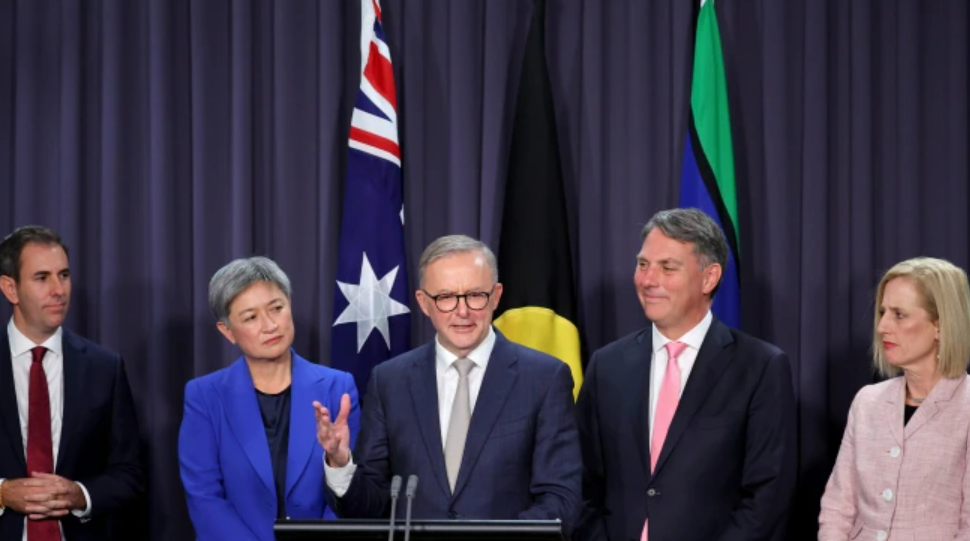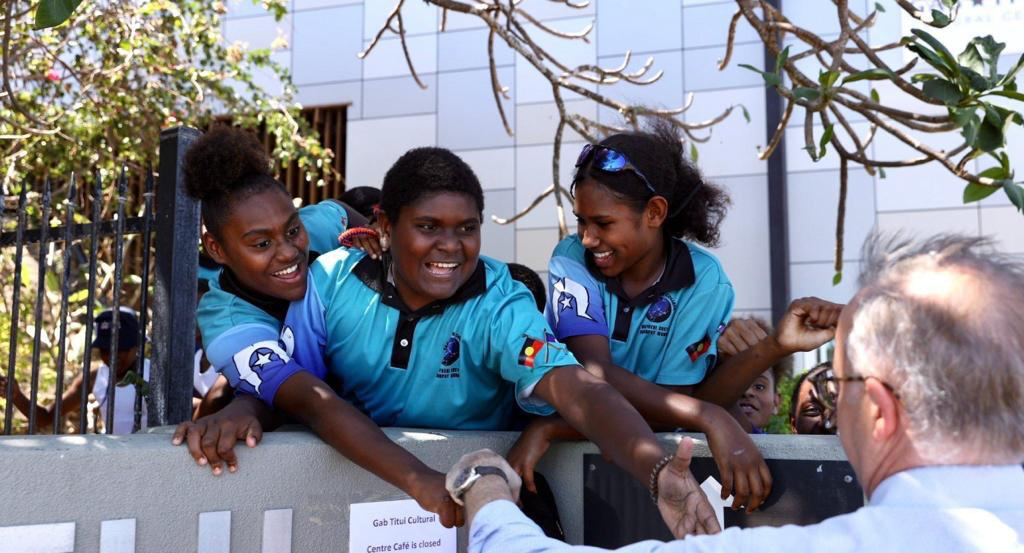100 Days of Albanese – Growing into Government
As The Honourable Anthony Albanese, MP Prime Minister of Australia reaches the mini milestone of his first 100 days in office, we look back at the break-neck pace Prime Minister Albanese took in the early days of Governing. From his swearing-in two days after the election, the reform agenda, poll dominance and how Labor sees out 2022.
As you will recall, Labor took a small target approach to the Federal Election. Promising to restore integrity in Parliament, quality budget spending rather than quantity, an end to the ‘climate wars’, easing the cost-of-living pressures, an improved relationship with Australia’s international neighbours, and an energy policy fit for a transitioning market.
“This is a choice between shaping the future or being shaped by it.”
– Anthony Albanese on the campaign trail.
It ultimately paid off, with a national swing of around 3.7% Labor was able to secure 77 seats to the Liberal National Coalition’s 55, while the Greens and Independents now hold 16 seats. As Albanese claimed victory on election night, the pace at which he wished to govern was evident.
“…my Deputy, Richard Marles, and my Senate leader, Penny Wong. My terrific economic team led by Jim Chalmers and Katy Gallagher. On Monday morning, arrangements are in place to have these people sworn in as members of my team. To enable Penny and I to attend the important Quad leader’s meeting in Tokyo, with President Biden, Prime Minister Kishida and Prime Minister Modi. I want the leaders of the economic team to start work on Monday morning as well.” – Anthony Albanese’s victory speech on Election night.
Assertiveness Abroad – Foreign Policy
His intentions to renew and redefine Australia’s global relations as a robust middle power were in action. The Prime Minister’s efforts portray his hope to re-invigorate Australia’s position in the region.
He began his travels the day after the election and travelled to Japan to represent Australia in the fourth Quad Leader’s Tokyo Summit. The Quad partnership with India, Japan and the United States is a key pillar in Australia’s foreign policy, designed to ensure the Indo-Pacific region is free and resilient, while working collaboratively on climate policy, defence and trade. A move US President Joe Biden remarked upon as a “testament to Australia being all in”.
“It is an honour that this is my first act as prime minister to attend this important leaders’ meeting here in Japan,” – Albanese addressing the Quad.
The Prime Minister’s next stop in early June was Indonesia, the largest nation in the Pacific by area and population. The PM and an economic and diplomatic delegation visited Jakarta and President Joko Widodo, marking the nation’s first engagement since the Indonesian President’s inauguration.
As a rapidly developing future superpower, courting Indonesia will become an essential aspect of Australia’s continued economic development and soft power in the coming decades: these trends will shape policymakers’ overall strategy toward our Northern neighbour.
Albanese’s third outing was to Europe, starting with the NATO Summit in Madrid, where Australia’s invitation suggests increased Western scrutiny in the Pacific as China continues to expand its influence. The PM spent some time in Paris, meeting French President Emmanuel Macron to patch up and reset the relationship after the much-publicised Submarine debacle. Finally, a visit to Kyiv to meet with President Volodymyr Zelenskyy to boost military to the embattled people of Ukraine.
Foreign Minister Penny Wong also joined the international reintroduction of Australia. Travelling to Fiji, Minister Wong focused the visit on building a stronger Pacific family. Next, a meeting in Singapore to discuss economic and strategic policy with Heads of Government and attended the G20 in Indonesia with a sideline event of the twenty-first meeting of Mexico, Indonesia, the Republic of Korea, Turkey, and Australia (MIKTA) Foreign Ministers.
“Australia will listen and work together to face our shared challenges and achieve our shared aspirations.” – said Penny Wong in preparation for her meeting with Fijian Counterparts.
Home Is Where The Heart Is – Domestic Policy
The new Government has been broadly complimented for its swift beginning in fulfilling the election commitments in the first sitting of the new Parliament, taking 18 pieces of legislation to the dispatch box in the first sitting of the new Parliament. The Climate Change Bills, Aged Care Reform Bill, Paid Domestic Violence Leave and the repealing of the Cashless Debit Card all sailed through the lower house, stamping Labor’s authority on the Parliament.
Leading Cabinet Ministers Chris Bowen, Tanya Plibersek and Anika Wells have taken on their portfolios with gusto. All seem to have a shared view of timing and place to enact the policy changes to build the foundation of a modern Australia in the 21st Century.
As Minister for Climate change and Energy, Chris Bowen has one of the most challenging tasks within the cabinet. As Minister, he must deliver on Labor’s pledge that a 43% reduction in emissions will be achieved by 2030 while ensuring a relatively smooth transition to a renewable energy base.
The cross-over with Minister Bowen’s and Tanya Plibersek’s gigantic portfolio of Environment and Water is establishing a balance of allowing mining to continue in the critical mineral space without hampering the efforts to develop renewable technology that uses critical minerals mined in Australia. So far, smooth sailing.
“The Government will be working in collaboration with states and territories, industry, community groups and the Australian people to drive down emissions while ensuring secure, affordable energy supplies.” – Chris Bowen, Minister for Climate Change and Energy.
The Voice Of The Nation
The Prime Minister’s first utterance to Parliament was a commitment to the Uluru Statement from the Heart. Prime Minister Albanese followed his commitment with a drafted question pledging to hold another Australia-wide referendum in adding a constitutional Voice to Parliament for Indigenous Peoples.
“We should consider asking our fellow Australians something as simple as ‘Do you support an alteration to the constitution that establishes an Aboriginal and Torres Strait Islander Voice?” – Prime Minister Anthony Albanese addressing the Garma Festival.
Some contention exists within Parliament over the necessity for A Voice to Parliament and the mechanism, with indigenous Greens Senator Lidia Thorpe calling for a treaty and truth-telling commission instead. Adding a constitutional requirement for an Indigenous presence would act as a safeguard to ensure a level of Indigenous representation and acknowledgment without relying on another diverse parliament, such as the 47th.
Indeed, this will be a long-standing discussion until the referendum comes about. There are nuances to such a difficult conversation, history to consider, and a future to decide. However, there is no doubt that a meaningful discussion is under-way and increased diversity of Australia’s Parliament will continue to foster such conversations.
Jobs Jobs Jobs
Amid severe skilled worker shortages, a crisis in labour participation, sluggish wage growth, growing inflation and job security, the Jobs and Skills Summit is an opportunity to reset. For employers, it is their chance to meet with the Government, Unions and Non-Government sector leaders.
Led by Prime Minister Albanese and Treasurer Jim Chalmers, only about 100 people will be in attendance at the summit at Parliament House. 30 per cent of the spots are for business, 30 per cent for unions, 30 per cent for community groups and academics, and 10 per cent for state and local government. Other smaller Jobs and Skills Roundtable events are currently happening across the country with Member for Parramatta Dr Andrew Charlton hosting a Western Sydney Summit on Thursday.
“Issues like skills shortages, barriers to work, flatlining productivity and weak wages growth have been holding our economy and our country back – we want to release the handbrake,” – Treasurer Jim Chalmers
The Federal Department of Treasury last week released an issue paper for the summit that included discussion points such as industrial relations, how to boost job security and wages, maintaining full employment and lifting productivity. However, the issue of Tax reform will not be discussed in at the Summit.
What We Can Expect To See
As we enter the warmer months, Labor will continue to hammer home the advantage over the Liberal National opposition. The continuing uptick in the poll numbers suggests that the nation is warming more and more to the Albanese government, which has made good progress establishing its policy agenda.
What we can expect is this over the next few months.
- The budget delivered in October will likely include an economic measure of wellbeing for the first time.
- An independent National Anti-Corruption Commission Bill to be tabled and legislated by the end of 2022
- Robodebt Royal Commission – commissioner to be unveiled.
- The first look at the Backing Small Business policy
- Aged Care reforms to pass the Senate
- Indigenous Referendum date
- The COP27 (2022 United Nations Climate Change Conference) will be held in Sharm El-Sheikh, Egypt will welcome Australia’s moves into the renewable space.
In Case You Missed It & Tweet of the Week

Latest posts by Nexus APAC (see all)
- United Kingdom General Election 2024: An Overview - April 15, 2024
- Australian Voters Go to the Polls - February 26, 2024
- Secretaries of Federal Departments – An Overview - February 1, 2024



